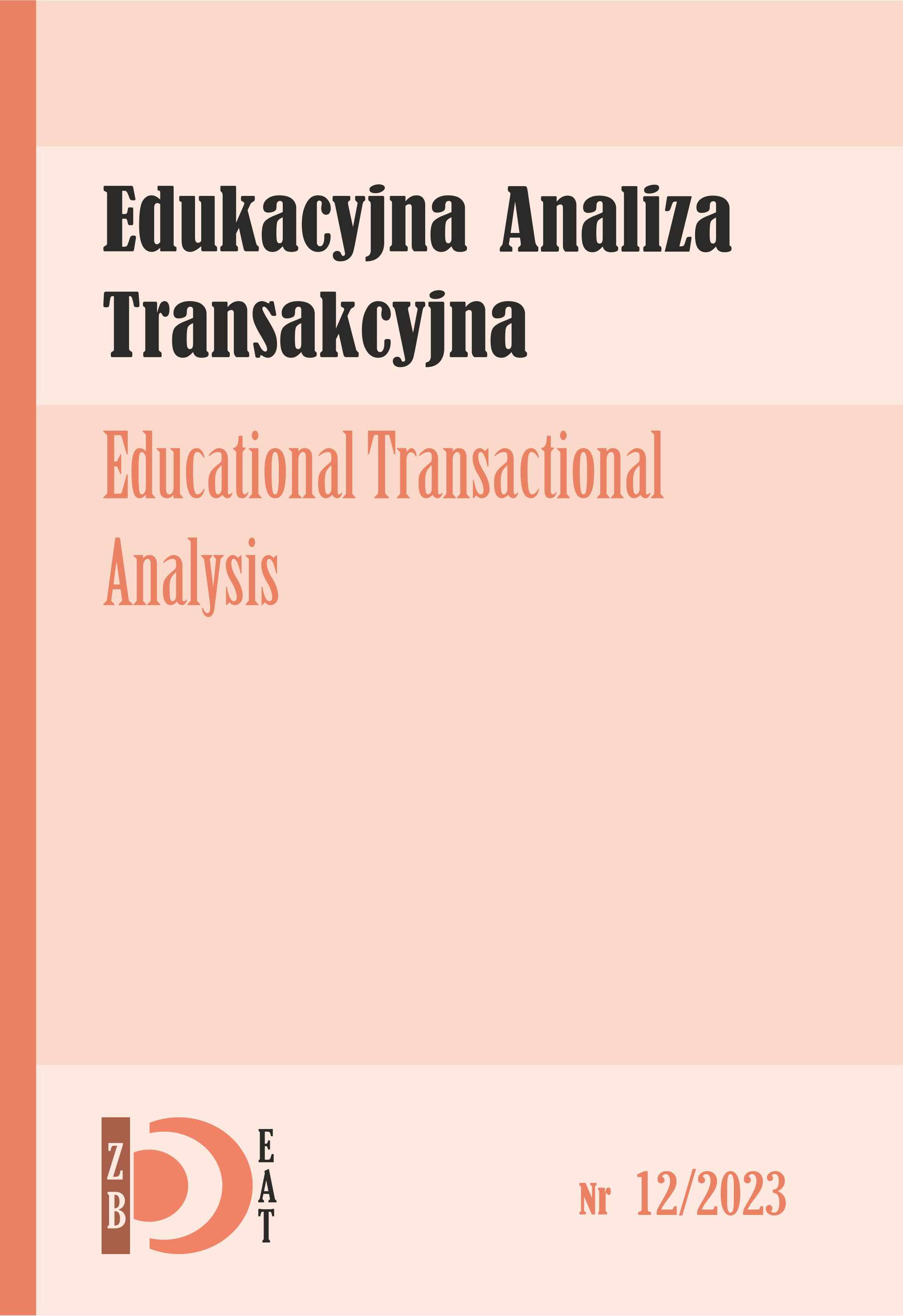Estymacja stanów ego: perspektywa uczenia maszynowego
DOI:
https://doi.org/10.16926/eat.2023.12.06Słowa kluczowe:
estymacja stanów Ja, stany Ja w ujęciu czasu, sztuczna inteligencja, uczenie maszynowe, MS Kinect™Abstrakt
Styk dziedzin uczenia maszynowego (UM) i psychologii jest obszarem intensywnych badań od wielu lat. W tym zakresie Analiza Transakcyjna (AT), ze swoim strukturalnym i precyzyjnym językiem, stanowi obiecujący obszar dla zastosowań technik UM, wytyczając nowe potencjalne kierunki badawcze. Prezentowany artykuł odnosi się do połączenia metod sztucznej inteligencji, uczenia maszynowego i psychologii, skupiając się na opracowaniu metody i środowiska oprogramowania pozwalającego na estymację stanów Ja przy użyciu danych z sensora MS Kinect™. Referowane badania koncentrują się na rejestrowaniu behawioralnych wskaźników stanów Ja. Danymi wejściowymi są nagrania audio i wideo oraz tzw. dane szkieletowe z sensora MS Kinect™. Autorzy prezentują metodę etykietowania i wizualizowania danych z sensora Kinect. W ramach badania zebrano zestaw danych obejmujący nagrania 15 studentów z Politechniki Śląskiej. Do etykietowania danych wykorzystano dziewięć odrębnych etykiet, odzwierciedlających stany Ja Rodzic, Ja Dorosły i Ja Dziecko w różnych wymiarach czasowych obejmujących przeszłość, teraźniejszość i przyszłość. Podstawowym rozpatrywanym elementem stanowiącym źródło informacji wykorzystane podczas etykietowania była treść wypowiedzi uczestników. Zasadniczym rezultatem pracy jest oprogramowanie stanowiące środowisko badawcze, którego architektura pozwala na badanie różnych modalności a także różnych algorytmów klasyfikujących. W pracy omówiono wstępne wyniki obejmujące opracowane techniki wizualizacji oraz interpretację wynikających z nich obserwacji. Ostatnia część artykułu omawia możliwości zastosowania przedstawionej metody w obszarze edukacji.
Downloads
Bibliografia
Alon, D., Jeongwoo K. (2021), GoEmotions: A Dataset for Fine-Grained Emotion Classifica-tion., Software Engineers, Google Research.
Bainbridge, W. S. (2013). Personality capture and emulation. Springer Science & Business Media. http://dx.doi.org/10.1007/978-1-4471-5604-8
Berne's family members (2022). Transactional analysis. Retrieved from https://ericberne.com/transactional-analysis/ (12.2023).
Dibeklioğlu, H., Salah, A. A., & Gevers, T. (2012). Are you really smiling at me? spontaneous versus posed enjoyment smiles. In Computer Vision–ECCV 2012: 12th European Confer-ence on Computer Vision, Florence, Italy, October 7-13, 2012, Proceedings, Part III 12 (pp. 525-538). Springer Berlin Heidelberg. http://dx.doi.org/10.1007/978-3-642-33712-3_38
Ekman, P. (1984). Expression and the nature of emotion. Approaches to emotion, 3(19), 344.
Enock, K. (2006), Leigh-Hunt, N. (2016). Behaviour change in individuals and organisations. Retrieved from http://www.healthknowledge.org.uk/public-health-textbook/organisation-management/5a-understanding-itd/transactional-analysis (12.2023).
Fujita, H., Sawai, N., Hakura, J., & Kurematsu, M. (2009, February). An action decision model for emotions based on transactional analysis. In Proceedings of the 8th WSEAS interna-tional conference on Artificial intelligence, knowledge engineering and data bases (pp. 79-88).
Harsh B. (2021). Diagnosis of ego states. Institute for Counselling Transactional analysis, Pu-ne Mumbai Chapter. Retrieved from https://ictapunemumbai.org/diagnosis-of-ego-states (12.2023).
Lowen, A. (1971). The language of the body. New York: Collier Books.
Minamikawa, A., & Yokoyama, H. (2011). Personality estimation based on weblog text classi-fication. In Modern Approaches in Applied Intelligence: 24th International Conference on Industrial Engineering and Other Applications of Applied Intelligent Systems, IEA/AIE 2011, Syracuse, NY, USA, June 28–July 1, 2011, Proceedings, Part II 24 (pp. 89-97). Springer Berlin Heidelberg. http://dx.doi.org/10.1007/978-3-642-21827-9_10
Minamikawa, A., & Yokoyama, H. (2011, March). Blog tells what kind of personality you have: egogram estimation from Japanese weblog. In Proceedings of the ACM 2011 conference on Computer supported cooperative work (pp. 217-220). http://dx.doi.org/10.1145/
1958856
Nurzyńska, K., & Smolka, B. (2017). Spontaneous Smile Detection with Application of Land-mark Points Supported by Visual Indications. In CS & IT Conference Proceedings (Vol. 7, No. 1). CS & IT Conference Proceedings. http://dx.doi.org/10.5121/csit.2017.70118
Pankowska, D. (2010). Nauczyciel w perspektywie analizy transakcyjnej. Wydawnictwo Uni-wersytetu Marii Curie-Skłodowskiej.
Ricks, B. C., & Egbert, P. K. (2012). More realistic, flexible, and expressive social crowds us-ing transactional analysis. The Visual Computer, 28, 889-898.
Stewart, I., Joines, V.(2016). Analiza transakcyjna dzisiaj. Rebis.
TEG Research Group – the University Tokyo Medical School. (2000). TEG: Tokyo University Egogram (New Ver.). Kaneko Shobou.
Cortes, C., & Vapnik, V. (1995). Support-vector networks. Machine learning, 20, 273-297.
Vartanov, A. V., Izbasarova, S. A., Neroznikova, Y. M., Artamonov, I. M., Artamonova, Y. N., & Vartanov, I. I. (2023). The effect of psychological mirroring in telecommunicative dia-logue. Cognitive Systems Research, 80, 110-117. http://dx.doi.org/10.1016/
j.cogsys.2023.02.008
Wieczorek, Z. (2017). Język zmiany w analizie transakcyjnej. In Edukacyjna Analiza Transak-cyjna, 6, 145–156.
Yamaoka, A. T., & Yoshida, M. (2007). Basic consideration for various interfaces from view-point of service. In Universal Access in Human-Computer Interaction. Applications and Services: 4th International Conference on Universal Access in Human-Computer Inter-action, UAHCI 2007 Held as Part of HCI International 2007 Beijing, China, July 22-27, 2007 Proceedings, Part III 4 (pp. 990-996). Springer Berlin Heidelberg. http://dx.doi.org/
1007/978-3-540-73283-9_107
Zhao X., Tao M., Chen Y., Yin B., Markopoulos P. (2023) Tailoring Persuasive Health Messag-es to the Predominant Ego State of Patients. In Lecture Notes in Computer Science (in-cluding subseries Lecture Notes in Artificial Intelligence and Lecture Notes in Bioin-formatics), 13832 LNCS, pp. 234 – 247. http://dx.doi.org/10.1007/978-3-031-30933-5_15
Pobrania
Opublikowane
Jak cytować
Numer
Dział
Licencja
Prawa autorskie (c) 2023 Jacek Szedel, Bożena Wieczorek

Utwór dostępny jest na licencji Creative Commons Uznanie autorstwa 4.0 Międzynarodowe.
Mam świadomość, że czasopismo jest wydawane na licencji Creative Commons - Uznanie autorstwa (https://creativecommons.org/licenses/by/4.0/legalcode).
Przesyłając artykuł wyrażam zgodę na jego udostępnienie na tej licencji

